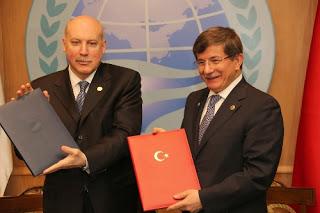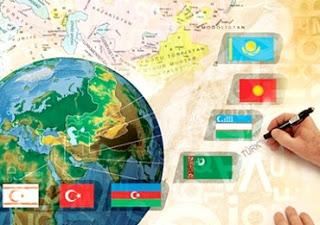 As of last April 26, Turkey is officially a “dialogue partner” of the Shanghai Cooperation Organization (SCO), the regional security body established in Shanghai in 2001 by the leaders of China, Kazakhstan, Kyrgyzstan, Russia, Tajikistan and Uzbekistan. During the signing ceremony, hold in Almaty, Turkish Foreign Minister Ahmet Davutoğlu said that Turkey “shares the same fate as Shanghai Cooperation Organization countries,” adding that the step undertaken by Ankara is “only a start”.
For his part, the Secretary General of the organization, Dmitry Mezentsev, stated that “there is every reason to believe that the SCO’s new dialog partner will not just observe the letter and spirit of the SCO charter, but also use the initiative potential of its role in the region for the good of the whole organization, for the realization of its overall goals, tasks and plans.” Mezentsev also expressed his conviction that the Turkish move towards the SCO will not be a cause for tension between it and NATO, of which Ankara is a member since 1952.
Turkey’s decision to approach the SCO, often represented as an Eastern “anti-NATO,” may actually be a reason of apprehension for the alliance, already dealing with the weakening of itspresence in the Caucasus and Central Asia. Nevertheless, Ankara’s move may also be the result of a geopolitical process covertly approved by Washington, aimed at weakening the SCO from within and prevent it to become a real alliance able to efficaciouslycounter US expansion in Eurasia.
After all, it would not be the first time that Washington uses Turkey to carry out a “divide and rule policy.” Significant,in this regard, is continued US sponsorship to Turkish accession to the European Union, conceived as a means for weakening a potential geopolitical competitor through fostering an internal “clash of civilizations” between its majority Christian population and a significant Turkish-led, Muslim minority.
Despite their divergences, often overemphasized by media, Washington and Ankara are still bonded by common geopolitical interests, first of all the containment of Iran and Russia. To achieve this aim, the Obama administration is currently fueling Turkish neo-ottoman ambitions in the Middle East and the Caucasus, in analogy with the support given by the White House to France’s renewed interest in the Mediterranean and Sub-Saharan Africa in anti-Chinese function.
Particularly eloquent is the Syrian civil war, through which Turkey, siding with the United States, Saudi Arabia, Jordan, the United Arab Emirates and Qatar, is playing a proxy war against Iran and Russia to counter Shia influence in the Middle East, and prevent Moscow to play a major role in the region. As a NATO member Muslim country, Turkey is perhaps the most important among the actors involved in the conflict, being the link between the West and the coalition of Arab countries sending weapons and financial support to the Free Syrian Army.
THE TURKIC WORLD (TÜRKI ÄLEMI)
As of last April 26, Turkey is officially a “dialogue partner” of the Shanghai Cooperation Organization (SCO), the regional security body established in Shanghai in 2001 by the leaders of China, Kazakhstan, Kyrgyzstan, Russia, Tajikistan and Uzbekistan. During the signing ceremony, hold in Almaty, Turkish Foreign Minister Ahmet Davutoğlu said that Turkey “shares the same fate as Shanghai Cooperation Organization countries,” adding that the step undertaken by Ankara is “only a start”.
For his part, the Secretary General of the organization, Dmitry Mezentsev, stated that “there is every reason to believe that the SCO’s new dialog partner will not just observe the letter and spirit of the SCO charter, but also use the initiative potential of its role in the region for the good of the whole organization, for the realization of its overall goals, tasks and plans.” Mezentsev also expressed his conviction that the Turkish move towards the SCO will not be a cause for tension between it and NATO, of which Ankara is a member since 1952.
Turkey’s decision to approach the SCO, often represented as an Eastern “anti-NATO,” may actually be a reason of apprehension for the alliance, already dealing with the weakening of itspresence in the Caucasus and Central Asia. Nevertheless, Ankara’s move may also be the result of a geopolitical process covertly approved by Washington, aimed at weakening the SCO from within and prevent it to become a real alliance able to efficaciouslycounter US expansion in Eurasia.
After all, it would not be the first time that Washington uses Turkey to carry out a “divide and rule policy.” Significant,in this regard, is continued US sponsorship to Turkish accession to the European Union, conceived as a means for weakening a potential geopolitical competitor through fostering an internal “clash of civilizations” between its majority Christian population and a significant Turkish-led, Muslim minority.
Despite their divergences, often overemphasized by media, Washington and Ankara are still bonded by common geopolitical interests, first of all the containment of Iran and Russia. To achieve this aim, the Obama administration is currently fueling Turkish neo-ottoman ambitions in the Middle East and the Caucasus, in analogy with the support given by the White House to France’s renewed interest in the Mediterranean and Sub-Saharan Africa in anti-Chinese function.
Particularly eloquent is the Syrian civil war, through which Turkey, siding with the United States, Saudi Arabia, Jordan, the United Arab Emirates and Qatar, is playing a proxy war against Iran and Russia to counter Shia influence in the Middle East, and prevent Moscow to play a major role in the region. As a NATO member Muslim country, Turkey is perhaps the most important among the actors involved in the conflict, being the link between the West and the coalition of Arab countries sending weapons and financial support to the Free Syrian Army.
THE TURKIC WORLD (TÜRKI ÄLEMI)
 But Turkish geopolitical ambitions are not limited to the Middle East, concerning also the Caucasus and Central Asia, though Turkic populations can be found throughout the entire Eurasia, including large parts of Russia, China and Iran. On November 21, 2008, the governments of Turkey, Azerbaijan, Kazakhstan and Kyrgyzstan established the Parliamentary Assembly of Turkic-speaking Countries (TÜRKPA). Despite the organization selected the principles of independence, sovereignty, territorial and state boundaries integrity of its members among its primary goals, the Pan-Turkic spirit behind the initiative appears clear.
For this reason, Turkey’s rapprochement to Moscow and Beijing through its acquired status of “dialogue partner” of the CSO raises many doubts about Ankara’s Eurasianist breakthrough. Despite criticism expressed by the Turkish establishment on Europe, guilty of not willing to accept among its members one of the world’s fastest growing economies, Turkey’s Atlantic loyalty seems to be out of discussion. Therefore, a further integration of Turkey into the structures of the SCO, far from turning the organization into a powerful Eurasian alliance, would instead be a means to block its development from within, ultimately being another step of NATO’s long march towards the heart of Eurasia; a march that Russia, China and Iran are anyway decided to hinder, through or without the SCO.
But Turkish geopolitical ambitions are not limited to the Middle East, concerning also the Caucasus and Central Asia, though Turkic populations can be found throughout the entire Eurasia, including large parts of Russia, China and Iran. On November 21, 2008, the governments of Turkey, Azerbaijan, Kazakhstan and Kyrgyzstan established the Parliamentary Assembly of Turkic-speaking Countries (TÜRKPA). Despite the organization selected the principles of independence, sovereignty, territorial and state boundaries integrity of its members among its primary goals, the Pan-Turkic spirit behind the initiative appears clear.
For this reason, Turkey’s rapprochement to Moscow and Beijing through its acquired status of “dialogue partner” of the CSO raises many doubts about Ankara’s Eurasianist breakthrough. Despite criticism expressed by the Turkish establishment on Europe, guilty of not willing to accept among its members one of the world’s fastest growing economies, Turkey’s Atlantic loyalty seems to be out of discussion. Therefore, a further integration of Turkey into the structures of the SCO, far from turning the organization into a powerful Eurasian alliance, would instead be a means to block its development from within, ultimately being another step of NATO’s long march towards the heart of Eurasia; a march that Russia, China and Iran are anyway decided to hinder, through or without the SCO.

